- Home
- David Downing
Lehrter Station Page 12
Lehrter Station Read online
Page 12
Back on the pavement outside, Russell watched as another pathetic clutch of returning POWs straggled by in the middle of the road. As a Soviet jeep approached from the opposite direction, it seemed to take all their energy to step out of its path, and one man proved too slow. Clipped by the front wing of the vehicle, he tumbled to the ground. The Red Army driver shouted abuse over his shoulder and kept going, leaving the man to slowly pick himself up. His comrades plodded on, offering no help.
Russell made his way back to the Alex, and went in through the old No.1 doors on Dircksenstrasse. There was less frenzied activity than he remembered, the faces younger but no less hard. Which was hardly surprising – in Soviet eyes, the German police force would have been irredeemably tarnished by its close association with the Nazi state. Most of the old guard would be gone, replaced by those young or politically reliable enough to satisfy the new masters. The Soviets had their own police HQ in the south-eastern outskirts, but their presence here was no less real for being invisible.
The desk sergeant was one of the few older faces, but denied any knowledge of Kriminalinspecktor Uwe Kuzorra. He suggested a personnel office on the other side of the inner courtyard, but no one there could be of any help. All the police files had disappeared, one young man told Russell. He seemed pleased by the loss, implying that it offered a welcome break with the past.
For the criminals too, Russell thought but didn’t say.
He went in search of Kuzorra’s old office, where he’d first heard the news that the Gestapo were after him. No one challenged his presence en route, but when he reached what seemed the right corridor, all of the likely offices lay empty. There were secretaries in two rooms further along, but neither recalled the detective’s name.
Russell traced his way back to the outside world. Kuzorra might have retired soon after their last meeting in 1941. He – and the possibility was chilling – might have been arrested, even executed, for his part in helping Russell escape. Then again, he was more likely to have been killed by a bomb or a shell, like a hundred thousand other Berliners. But whatever his fate, it seemed strange that no one remembered him in the place where he’d spent his working life.
Russell wondered what to do. His main reason for seeking out Kuzorra was to thank him, but he had also nursed a vague hope that the detective would still be working, and in a position to offer him some help. The old Kuzorra could have provided a rundown of what made the new Berlin tick, and what stories were crying out for investigation. He would also have known how best to mount a search for missing Jews.
Maybe he’d retired at the end of the war – he had to be nearly seventy. If so, and if his building had survived, he would probably still be living on Demminer Strasse, which was only a short ride away on the U-Bahn. Or had been in better times. Descending the steps at Alexanderplatz station, he discovered that an unexploded bomb had been found in the tunnels, and the service north suspended.
Back on the surface, he thought about taking a bus, but the first one that came was so tightly packed that only two of the waiting crowd could get on. He supposed he could walk, but what was the point when tomorrow would do just as well?
The problems besetting public transport reminded him he’d once owned a car. Like most private vehicles, it had been forced off the road by war regulations and the acute fuel shortage. Russell had left the Hanomag at the garage where he’d bought it, from Miroslav Zembski’s cousin Hunder. And if it hadn’t fallen victim to high explosives, the car might still be waiting for him. Ordinary Berliners were still forbidden to drive, and petrol was almost impossible to come by, but he was officially an American, and one of his spymasters might like the idea of motorising their favourite agent. It had to be worth a shot.
This flight of fancy sustained him throughout the S-Bahn ride to Lehrter Station, and down several streets of ruined workshops and small factories. But then came disappointment – Hunder Zembski’s yard had not survived its proximity to the nearby railway sheds. The gates were still standing but little else, and the packed lot he remembered from 1941 resembled a wreckers’ yard.
Clambering gingerly across a skein of twisted metal, he headed for where he’d parked the Hanomag, but that corner of the yard had obviously taken a direct hit, and all he could find was a jumble of pulverised brick and metal shards. If the car had not been moved beforehand, it never would be now.
He made his way back to Lehrter Station. A train was noisily pulling in, and he used a gap in the fence to get a better view. The locomotive was pulling cattle cars rather than coaches, and the waiting platform was lined with soldiers, nurses and men with armbands who Russell assumed were refugee agency officials. When the doors were opened people burst violently out, as if they’d been held in under pressure. The shoulders of one arrival visibly sagged as he took in the jagged skyline that lay beyond the roofless station. Could this be Berlin?
Around the station a sprawling refugee camp had grown up. There were hundreds, perhaps thousands, of people living in burnt-out offices, overturned wagons and any niche that a sheet of corrugated iron could roof over. As he looked back at the train, the first of many stretchers was lifted down from the cattle cars. Each bore a human load, but none showed signs of life.
Russell remembered the nights in 1941, when he and Gerhard Ströhm had watched trains like these leaving Berlin with their cargo of Jews for ‘resettlement’. The cattle cars looked the same, but this time the cargo was German. These families had been driven from the old Junker heartlands in the east by the victorious Russians and Poles. They had paid the bill for Hitler with their loved ones and their homes.
His reporter’s instinct told him two things – that this was a huge story, and one that the victors would rather not read. Ninety-nine per cent of these refugees would be innocent of any serious crime, but as far as the world was concerned, being German was guilt enough, and any such suffering thoroughly deserved.
* * *
For Effi, entering Ernst Dufring’s house in Schmargendorf was like stepping into a time machine. The hall was plastered with framed movie posters from the golden age of German cinema, the huge living room a shrine to Bauhaus interior design. Even the other actors seemed wellfed, with none of the yellow-grey pallor that characterised most Berliner faces. Only the shell-shattered spire of the church across the street offered proof of the war just fought and lost.
Effi had wondered what sort of reception she would receive, but everyone seemed pleased to have her on board. And more than happy in general, as if they’d just won top prize in a national sweepstake. In a way they had, she supposed. The people in this room were pioneers, the first movie-makers of the new Germany.
The writer Ute Faeder, a tall blonde in her forties with a wry sense of humour, explained some changes she had made in the script, and Dufring then listed the scenes they would run through that morning. He looked much older than Effi remembered, but there was no doubting his enthusiasm for making this particular movie. ‘I know you’ve only just received the script,’ he told Effi, ‘but do your best.’
Her confidence increased as the morning passed, but nailing this character was going to be hard. She wasn’t sure why her character let the man stay on in her flat; she only knew that Lilli’s own experiences in the camp had made it impossible for her to evict him. But what experiences, and how could Effi access them? Her week in a cell at the Gestapo’s Prinz-Albrecht-Strasse HQ had certainly been frightening, but she hadn’t gone hungry, hadn’t been physically abused. Lilli, by contrast, had endured years of the worst that the Nazis could offer. How could Effi make sense of her psyche? She needed to talk to people with such experiences, she thought. If she was going to play this role with any conviction, she needed to hear their stories.
It occurred to her that she had never felt this need before – imagination had been enough. Perhaps that was the point – what had happened over the last few years was literally unimaginable. And it would need films like this to make it less so. Movies like this rea
lly mattered, unlike most she had made.
This thought had only just crossed her mind when Lothar Kuhnert appeared at her side. ‘I’m afraid we have a problem,’ were his first upsetting words. ‘The British have refused your Spruchkammer certification.’
‘Oh no. Why, for heaven’s sake?’
‘A lot of nonsense about you playing “iconic Nazi roles”, whatever than means. The real reason is that the Americans have insisted.’
‘What in heaven’s name have I done to upset them?’
‘They’re adopting a harder line towards ex-Nazis, and…’
‘I wasn’t a Nazi!’
‘We know that. But some Americans don’t understand that it was possible to do well in the Third Reich without being one.’
‘Oh God! Doesn’t the fact that the Gestapo was hunting me for four years make any difference?’
‘It should. It will. Just leave it with me.’ He sighed. ‘The good news is that there’s no urgency. They’re still investigating Ernst, and there’ll probably be others. But we’ll get this film made, one way or another.’
‘We should,’ Effi told him. ‘It’s worth making.’
* * *
It was almost dark when Russell found himself outside Otto Pappenheim’s door in the Solinger Strasse apartment block. Again there was no answer to his knock, but this time a different neighbour emerged. Three cigarettes – a gross overpayment, as Russell later discovered – was enough to overcome any reluctance he had about disclosing Otto’s place of work. It was a nightclub on the Ku’damm called, suitably enough, Die Honig-falle. The Honey Trap.
Outside it was growing dark. He walked south, took the temporary walkway across the foul-smelling Spree, and skirted the western perimeter of the silenced zoo. Feeling hungry, he stopped for a sandwich at the Zoo Station buffet and idly leafed through a newspaper that someone had quite understandably left behind. There was nothing in it, save for sundry do-it-yourself tips for the average Berlin householder circa 1945 – ‘how to repair a roof without tiles,’ ‘how to mend a wall without bricks’ – and hundreds of messages from people seeking either long-lost relatives and friends or strangers willing to share their body-heat.
There were neon lights burning on the Ku’damm, but not that many by pre-war standards. There were British soldiers on the pavements, and almost as many German girls, but the night was obviously young. According to Thomas, bus-loads of girls from the Soviet sector – where payment of any kind could rarely be taken for granted – arrived around mid-evening.
The Honey Trap was on the northern side, in the basement of a half-demolished building that Russell vaguely remembered as a music school. The two bouncers guarding the top of the steps looked barely out of their teens, and managed to convey the impression that only their dates of birth had prevented them joining the Nazis.
They eyed Russell with professional suspicion, but relaxed when he mentioned Otto Pappenheim. ‘He’ll be in the office at the back,’ one said, in a tone suggesting surprise that anyone wanted to see him. Walking down the steps, it occurred to Russell that mention of his quarry’s name had not yet produced a single positive reaction.
The barely-lit basement room smelt of stale beer, cigarette smoke and sweat. A barman gestured him through to the room at the rear, where another man was seated at a small and rickety-looking table, his head bent over an accounts ledger. As he looked up, Russell saw dark hair, dark eyes, and features sharp enough to invite comparisons with rodents. The man was probably in his thirties, which was about right for Rosa’s father, but he bore little resemblance to the Nazi stereotype of a Jew. But then few Jews did. ‘Otto Pappenheim?’ he asked.
‘Yes,’ the man replied after only the slightest of hesitations. The eyes were suspicious, but what Jew’s eyes wouldn’t be after the last twelve years?
‘I’m looking for someone of that name,’ Russell said, looking round for something to sit on. There was nothing.
‘Why? Who are you?’
‘My name’s John Russell. I’m not with the police or anything like that – I’m just an ordinary citizen.’
‘Okay,’ the man said almost cheerfully. The news that Russell had no connection to the authorities seemed something of a relief.
‘I’m looking for an Otto Pappenheim who left a wife and daughter early in the war, most likely through no choice of his own. His wife’s name was Ursel, and they had a daughter name Rosa…’
‘I never had a daughter,’ the man said. ‘And my wife died in a camp. We had no children. Thank God,’ he added as an afterthought.
‘Ah. I’m sorry.’
‘No, it’s over.’ He smiled thinly. ‘We have to live in the present now.’
‘Of course. But have you ever run across anyone else with the same name?’
‘No. There are such men, I’m sure, but I have never met one.’
Russell could think of nothing else to ask. He thanked the man and walked back towards the front. Passing through the sparsely populated bar, he realised he fancied a drink.
‘What are you paying with?’ was the barman’s first question.
‘What do you take?’
‘What do you have?’
‘US dollars.’
‘They’ll do.’
‘And what else?’ Russell asked as his beer was poured.
‘Pounds. Cigarettes. There’s a list of exchange rates on the wall over there.’
Russell took a first sip and examined the sign. 3 British Woodbines were worth 1 American Pall Mall, and both were listed in their cash dollar equivalents. ‘What about German currency?’ he asked.
The barman laughed and turned away.
Russell found himself a table, sat down, and surveyed the room. The decor was as minimal as the lighting, and no attempt had been made to disguise the myriad cracks in the ceiling. A small dance floor lay between the sea of closely packed tables and a narrow, curtainless stage.
‘John Russell,’ a surprised voice exclaimed beside him.
‘Irma,’ he said, smiling and standing to embrace her. They had met in pre-war days, when she and Effi had been in the same musical. Hardly a highlight of Effi’s career, Barbarossa had marked a real low for Irma Wocz, who had first earned fame as a cabaret artist in pre-Nazi Berlin. She had to be in her mid-forties, but the dark eyes were still challenging, the full mouth still inviting, and the shining brunette hair would have convinced anyone who hadn’t last seen her as a blonde. Her figure, or what Russell could see of it inside the buttoned coat, still had curves to spare. ‘Please, join me,’ he said. ‘Have a drink.’
‘I certainly will,’ she said, sitting down opposite him. ‘But don’t think of paying for it. I work here.’ She raised a hand to get the barman’s attention, and ordered a bourbon on the rocks. ‘Where have you been since the shit hit the fan?’ she asked. ‘Someone showed me your picture in the papers,’ she explained. ‘After your little disagreement with our late lamented leader.’
Russell laughed. ‘We’ve been in England the last few months.’
‘You had the sense to stick with Effi?’
‘Yes, she’s here too. She’s making a movie with some people at the old Reichskulturkammer.’
She took her drink from the barman, and halved it in one gulp. ‘The comrades? That’s a sensible move. Once the Americans get bored and go home, they’ll be running everything.’
‘You think they will? Get bored, I mean.’
Irma shrugged. ‘Once they’ve fucked every girl in Berlin.’
‘You’re singing again?’
‘You could call it that.’ She smiled and emptied her glass. ‘I’m certainly getting too old to fuck for a living. Look, you and Effi should come one evening, for old time’s sake. We’re open every day but Monday. One on the house?’ she asked him, waving her own glass at the barman.
‘No, thanks. I haven’t eaten yet.’
‘Now there’s an overrated pastime. If there’s one thing we can thank the Führer for, it’s teaching us ho
w to live with hunger. Ah,’ she added, looking Russell’s shoulder, ‘here comes the boss.’
He turned to see a man walking towards them.
‘Good evening, Herr Geruschke,’ she said in greeting. He was around Russell’s age, the short side of medium height, with dark eyes and thick charcoal-coloured hair that was beginning to recede. He was smartly dressed in a dark grey suit, stiff-collared shirt, jazzy tie and shining brogues.
The smile, Russell noticed, did not extend to the eyes.
‘Irma,’ he said with the slightest of bows. He watched the barman replace her empty glass with a full one, and looked enquiringly at Russell.
‘This is an old friend,’ she explained. ‘John Russell. He lived in Berlin before the war.’
‘Are you English?’ Geruschke asked with a smile.
‘I am,’ Russell said. It was simpler than explaining his official pedigree as an American.
‘We have many English customers,’ Geruschke said. ‘But few are here by choice. In Berlin, that is.’
‘I’m just here for a visit,’ Russell told him. ‘Seeing old friends, that sort of thing.’ Something about the man gave him the creeps.
‘His girlfriend’s Effi Koenen,’ Irma volunteered. ‘She’s here to make a movie for the comrades.’
‘An actress? I haven’t heard the name, but then I never go to films.’ He turned back to Irma, whose second glass was almost empty. ‘Try not to get drunk before you perform,’ he told her sharply. ‘Herr Russell,’ he added, taking his leave with a slight nod and the faintest clicking of heels. As he walked away Russell found himself wondering what the man had been doing for the last twelve years. A question you could ask of any prosperous survivor.
‘He’s a real charmer, isn’t he?’ Irma muttered. ‘But he pays well.’
‘What’s his first name?’

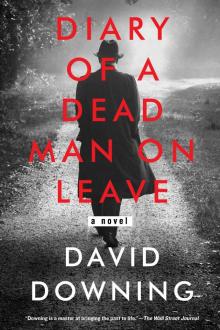 Diary of a Dead Man on Leave
Diary of a Dead Man on Leave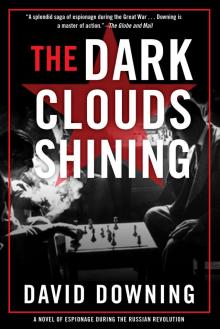 The Dark Clouds Shining
The Dark Clouds Shining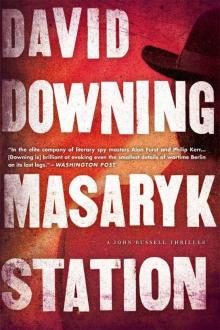 Masaryk Station (John Russell)
Masaryk Station (John Russell)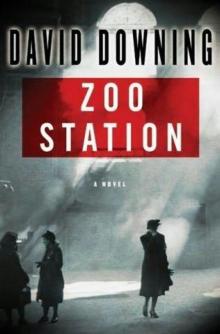 Zoo Stationee
Zoo Stationee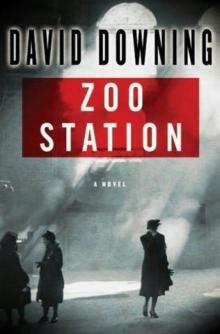 Zoo Station jr-1
Zoo Station jr-1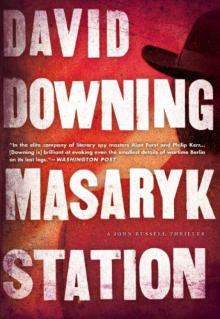 Masaryk Station
Masaryk Station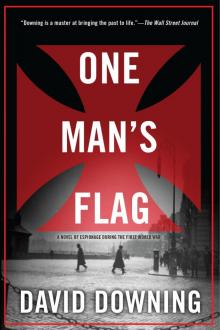 One Man's Flag
One Man's Flag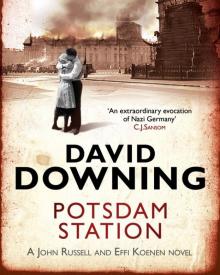 Potsdam Station jr-4
Potsdam Station jr-4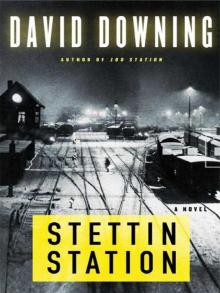 Stattin Station jr-3
Stattin Station jr-3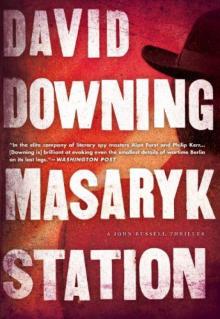 Masaryk Station jr-6
Masaryk Station jr-6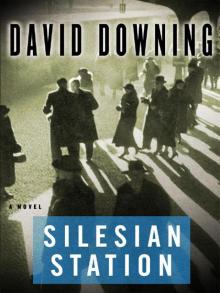 Silesian Station (2008) jr-2
Silesian Station (2008) jr-2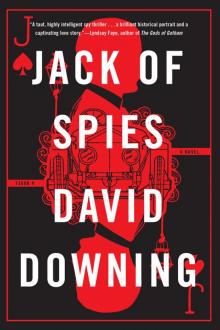 Jack of Spies
Jack of Spies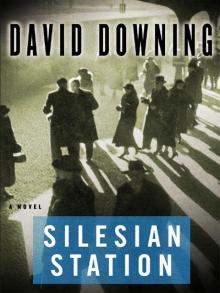 Silesian Station (2008)
Silesian Station (2008) The Moscow Option
The Moscow Option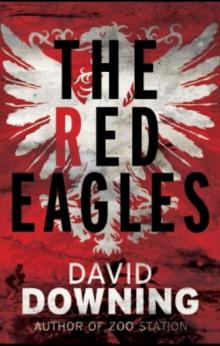 The Red Eagles
The Red Eagles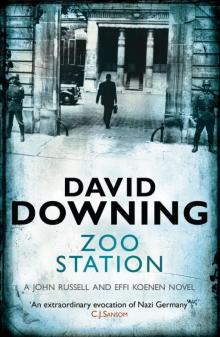 Zoo Station
Zoo Station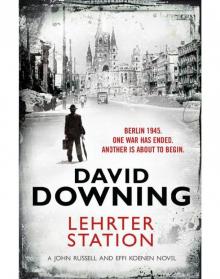 Lehrter Station
Lehrter Station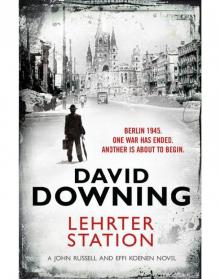 Lehrter Station jr-5
Lehrter Station jr-5